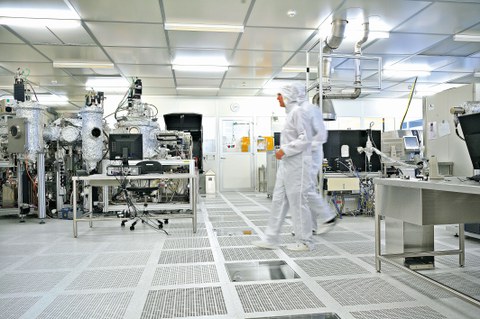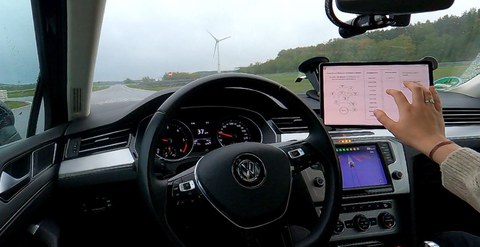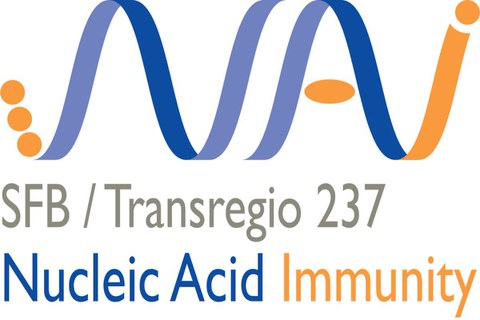Nov 29, 2022
Top-level research: TU Dresden enjoys success in competition for DFG funding millions with three follow-up proposals from physics, medicine and computer science

Research at TU Dresden
The Grants Committee of the German Research Foundation (DFG) opted for a funding period extension for 13 Collaborative Research Centers - three of which are in Dresden and work closely with TUD. This is because two of the alliances are CRC/Transregio (TRR), which have ties with a number of application universities.
Collaborative Research Centers allow innovative, ambitious and long-term research projects to be carried out within a network and therefore bolster the development of priority areas and the necessary structures at the applicant universities; they are funded for a maximum of twelve years. As of January 2023, the DFG will be funding a total of 279 consortia.
3rd funding period for Collaborative Research Center 1143: “Correlated Magnetism: Form Frustration to Topology” at TU Dresden

Depiction of a new time-reversal symmetry-breaking state formed by four-partite electron families in Ba1-xKxFe2As2. Cooperation of the Collaborative Research Center projects C01, C02 and C07.
The Dresden-based Collaborative Research Center 1143 - “Correlated Magnetism: from Frustration to Topology” has been successfully conducting fundamental research into solid-state physics for almost eight years. During this time, a plethora of groundbreaking contributions in the cutting-edge research field have been made here, which have established Dresden as a top location for topological solid-state physics. As the German Research Foundation confirmed today, the CRC was granted a third funding period starting next year. Spokesperson Prof. Matthias Vojta is anything but frustrated by this decision and is looking forward to the scientific “harvest” of the next four years.
At the beginning of every innovation is fundamental research, which involves the discovery and understanding of natural phenomena and principles. Based on these findings, new applications, advanced technologies, materials or artificial intelligence can subsequently be created. Topological solid-state physics is still a comparatively young field of fundamental research and is therefore still full of surprises and unexpected discoveries. On the one hand, it is about discovering phenomena - such as magnetism or superconductivity - that form the basis of modern technologies, and on the other hand, it is about recognizing fundamental principles - such as phase transitions or elementary excitations - according to which the world around us is organized. Topology represents a recent and important extension of these organizational principles.
Since 2015, the Collaborative Research Center 1143 "Correlated Magnetism: From Frustration to Topology" has been dedicated to a large class of magnets in which competing, i.e. frustrated, interactions prevent the formation of conventional magnetic order. Instead, they lead to a variety of alternative and non-trivial phenomena that are often topological in nature. The goal of the CRC is to identify, fabricate, and understand materials in which such phenomena can be observed.
In 21 subprojects in the fields of experimental physics, theoretical physics and inorganic chemistry with a total of more than 130 scientists , numerous groundbreaking contributions to this cutting-edge field of research have been made at the CRC 1143 in recent years, which have established Dresden as a top location for topological solid-state physics and from which numerous new collaborations between Dresden research groups and institutions have grown.
CRC spokesperson Matthias Vojta, Professor of Theoretical Solid State Physics at TU Dresden and also spokesperson of the Cluster of Excellence ct.qmat is delighted with the German Research Foundation’s decision: "The extremely positive reviewer vote is an enormous recognition for our successful work over the past eight years; furthermore, also for the fact that our CRC very coherently and uniquely in Germany shapes and advances the research landscape of quantum magnetism on an international scale. There is still a field full of surprises and unexpected discoveries ahead of us. One of the fascinating and approaching goals is the realization of a non-Abelian quantum spin liquid. Their excitations have the property of not only acquiring a phase factor when spatially swapped, such as fermions, but of changing their entire nature. Such particles are the basis for innovative applications in quantum information technology. In this sense, fundamental research and functionality in the field of magnetism were and are closely related. Our CRC aims to continue this tradition, and so in the third funding period we will continue to do exciting fundamental research, we will open up new subfields, we will use the infrastructure and expertise built up in the CRC to 'harvest', and we will set the course for the next CRC in physics."
Website: https://tu-dresden.de/mn/physik/sfb1143
The CRC / Transregio 237 “Nucleic Acid Immunity” enters the second round
The DFG has recently decided to continue funding the CRC /TRR237 “Nucleic Acid Immunity”. Prof. Veit Hornung, LMU Munich, takes over as spokesperson for the start of the second funding period from January 1, 2023. Prof. Min Ae Lee-Kirsch, TU Dresden, and Prof. Gunther Hartmann, University of Bonn, will be the spokespersons at the respective locations.
The CRC/TRR 237 aims to investigate the mechanisms and functional consequences of nucleic acid immunity. All life forms depend on recognizing and eliminating foreign genetic material to maintain their own integrity. The sophisticated mechanisms that have been developed for this purpose fall into three fundamental categories: a) the recognition of foreign nucleic acid by pattern recognition receptors, which are specialized for characteristic molecular structures and which provoke the activation of immune functions; b) the group of antiviral restriction factors, which, upon the appearance of foreign, unusual nucleic acids, directly break these down or impair their function, and c) enzymes of nucleic acid metabolism, which break down nucleic acids with certain characteristics or alter their structure. These three categories are integral components of a nucleic acid defense system, as genetic studies have shown in patients with inflammatory diseases characterized by a particularly pronounced type 1 interferon response, the type 1 interferonopathies.
As an interdisciplinary consortium with 26 subprojects, the CRC / TRR 237 brings together researchers and clinician scientists from the fields of immunology, cell biology, biochemistry, structural biology, pediatrics, dermatology, rheumatology, genetics and bioinformatics. Through their collaboration, they aim to uncover the specific molecular mechanisms of nucleic acid immunity to better understand the principles of action of this system. It is expected that, owing to the new insights into the fundamental function of this system, the consequences of misregulation and there disease processes in chronic viral infections, autoinflammation and autoimmunity will also be better defined.
The Dresden science hub primarily stands for disease-oriented translational research, in which groups from the Pediatric Clinic (German: Klinik für Kinder- und Jugendmedizin) (Prof. Min Ae Lee-Kirsch, Prof. Angela Rösen-Wolff, Dr. Christine Wolf) and the Dermatological Clinic (German: Klinik für Dermatologie) (Prof. Claudia Günther) are involved. Based on monogenetically defined disease patterns associated with autoinflammation and/or autoimmunity, disease mechanisms are to be elucidated both in patients and animal models, thereby contributing in the long term to the development of novel, causally targeted therapies. New to the group is Prof. Simon Alberti, Center for Molecular and Cellular Bioengineering, an internationally leading researcher in the field of cellular condensates formed by the process of phase separation. He will focus on the role of condensates in nucleic acid recognition and their subsequent signaling pathways.
The first funding phase was extended by six months due to the COVID-19 pandemic, so the second funding phase will last 3.5 years and will be funded with approximately 4 million euros per year.
Prof. Min Ae Lee-Kirsch, Pediatric Clinic, Carl Gustav Carus Faculty of Medicine at TU Dresden: “Clinical research at the Pediatric Clinic has become one of the leading groups in Germany and abroad in the field of type 1 interferonopathies in recent years. These are rare, mostly monogenic diseases of the immune system that lead to severe systemic and/or organ-specific inflammation. A key aspect of our research activities is that we are increasingly able to apply new scientific findings. For example, immunomodulatory drugs that target the type 1 interferon axis are therapeutically very effect with a number of patients. In addition, a better understanding of rare type 1 interferonopathies also provides new insights into the pathogenesis of common inflammatory diseases such as systemic lupus erythematosus or rheumatoid arthritis, in which the type 1 interferon axis also plays a role.
Prof. Esther Troost, Dean of the Carl Gustav Carus Faculty of Medicine at TU Dresden: “The expertise of the researchers at our Faculty of Medicine is reflected in the successful acquisition of research projects spanning many regions. The CRC / TRR 237 Nucleic Acid Immunity is a remarkable example of this. This is because it amalgamates the work of three internationally renowned universities.”
Prof. Michael Albrecht, Medical Executive Board of the Carl Gustav Carus University Hospital: “The funding extension of this Collaborative Research Center underscores how pivotal it is be active at the interface between research and patient care. Rare diseases often manifest themselves in early childhood and then require innovative therapy. With the continued funding, we can do work for the future here and directly pave the way to application.
Website: https://www.trr237.uni-bonn.de/en
Fundamental research to enable comprehension in a cyber-physical world
The Collaborative Research Center/Transregio 248 “Foundations of Perspicuous Software Systems - Enabling Comprehension in a Cyber-Physical World” enters the second funding phase

TU Dresden is involved in numerous studies on autonomous driving.
For the past four years, TU Dresden and Saarland University, alongside the Max Planck Institutes for Computer Science (MPI-INF) and Software Systems (MPI-SWS), have been conducting research at the Collaborative Research Center/Transregio (CRC/TR) 248, at the Center for Perspicuous Computing (CPEC), on the scientific foundations for computer-based systems of the future, whose functionality and behavior speak for themselves. The Grants Committee of the German Research Foundation (DFG) has now extended the CRC/TR “Foundations of Perspicuous Software Systems - Enabling Comprehension in a Cyber-Physical World” for a second four-year funding period.
Whether in autonomous vehicles or in digitally controlled smart homes - software and artificial intelligence (AI) are increasingly involved in actions and decisions that directly affect people. They support our everyday lives, are designed to reduced sources of danger and help solve problems. But when AI-supported systems make a decision that leads to a car accident or even a plane crash, it is often because they cannot explain their behavior and humans can no longer intervene. This is exactly where the research of the Center for Perspicuous Computing (CPEC) comes into play, striving to integrate intelligibility, comprehensibility and control directly into future system software.
For several years now, this institute has been creating scientific foundations for systems of the future that explain how they work (perspicuous systems). CPEC explores the formal design and analysis methods that generate necessary informational structures and, in particular, mathematical explanations. Novel approaches to human-computer interaction, visualization, and language generation will help transform the more abstract explanations into something that humans can also easily understand. This means that an autonomous vehicle could hand control back to humans when the control software has reached its limits.
“We are elated to be able to further advance the research field of “perspicuous computing” with the positive funding decision - for intelligible, comprehensible and predictable software-based systems,” explains Prof. Raimund Dachselt, head of the Interactive Media Lab in Dresden and head of the Chair of Multimedia Technology at the Faculty of Computer Science of TU Dresden. He is also the spokesperson for the CRC/TR 248 in Dresden: “It is important that we develop the systems that support us in everyday life in such a way that we can also understand and trust them.” In the coming funding period, more in-depth research will be conducted into how findings from the analysis of current systems can be used to design future systems. “Our focus is also on anthropocentric research (human-in-the loop) and the societal dimension (society in the loop) combined with the increasing legal requirements for systems working with AI. We want to contribute to reducing the risks”, emphasizes Prof. Dachselt.
In three major thematic areas with a total of 14 subprojects, 21 project leaders will research the scientific foundations of these “comprehensible computer systems” over the next four years. In addition to the two universities, the MPI-SWS and the CISPA Helmholtz Center for Information Security are involved in the second phase. The CRC/Transregio 248 combines research from the fields of formal methods, artificial intelligence, as well as speech-based human-computer interaction in a novel way. In the future, it will be possible to create software-based systems that act in a predictable and comprehensible way. The research at the CPEC therefore serves society’s growing need to maintain control over the computer-based systems. These are the systems with which we will all potentially interact, enabling a comprehensible, cyber-physical world. The German Research Foundation will fund the Collaborative Research Center/Transregio 248 with a total of 13 million euros starting in January 2023.
Website: https://www.cpec.science/
Media inquiries:
CRC 1143:
Prof. Matthias Vojta
Spokesperson CRC 1143
Tel.: +49 351 463-34135
CRC/Transregio 237:
Prof. Min Ae Lee-Kirsch
Pediatric Clinic (Klinik für Kinder- und Jugendmedizin)
Carl Gustav Carus Faculty of Medicine
Technische Universität Dresden
Tel.: +49 351 458-16878
CRC/Transregio 248:
Prof. Holger Hermanns (Spokesperson CRC/TR 248, Saarland University)
Prof. Raimund Dachselt (On-site spokesperson CRC/TR 248, Technische Universität Dresden)
Tel.: +49 351 463-38507

